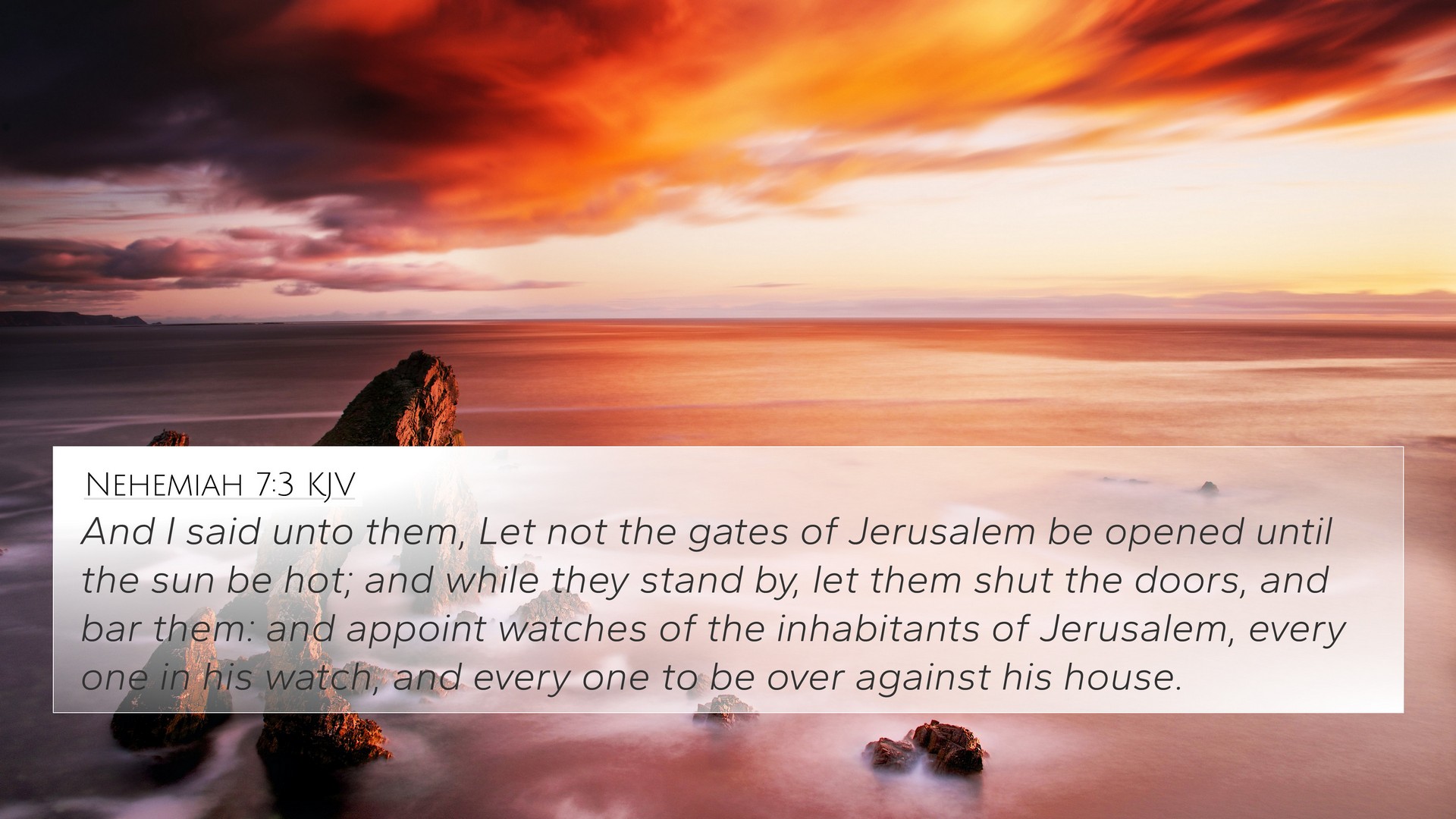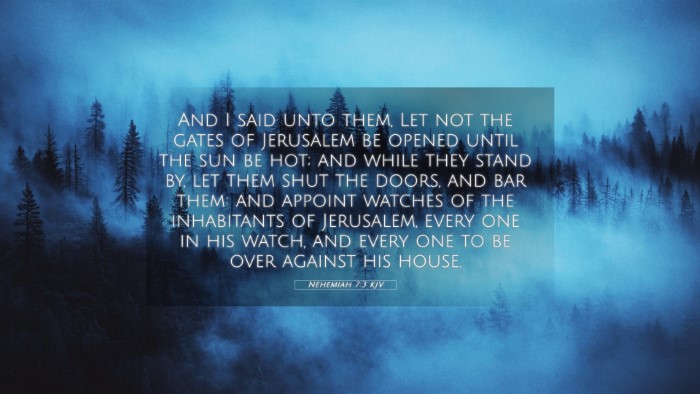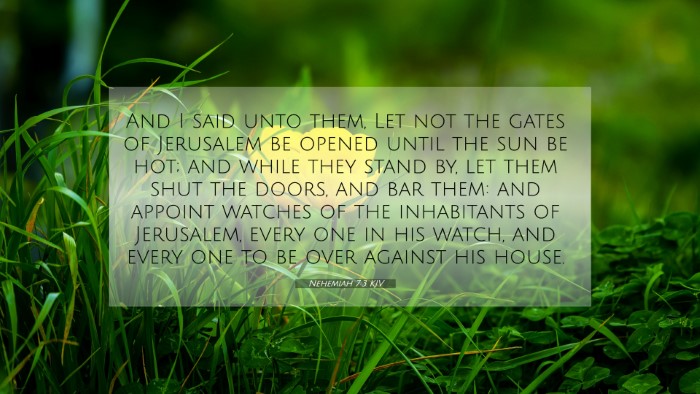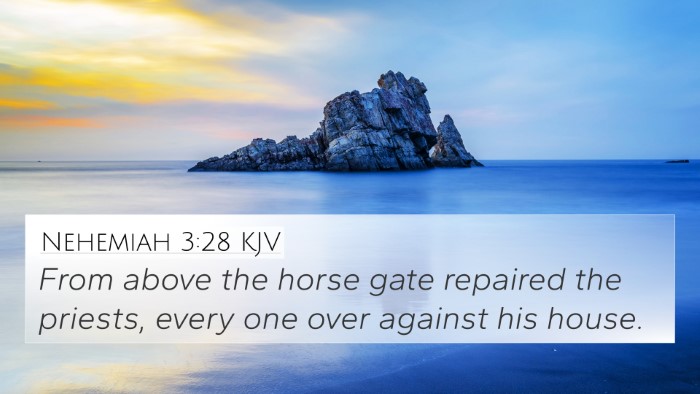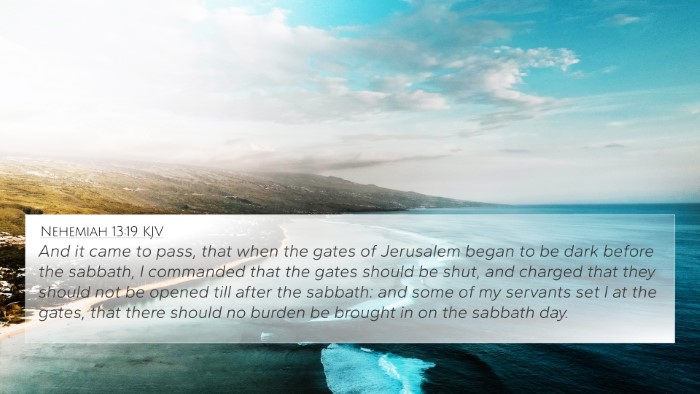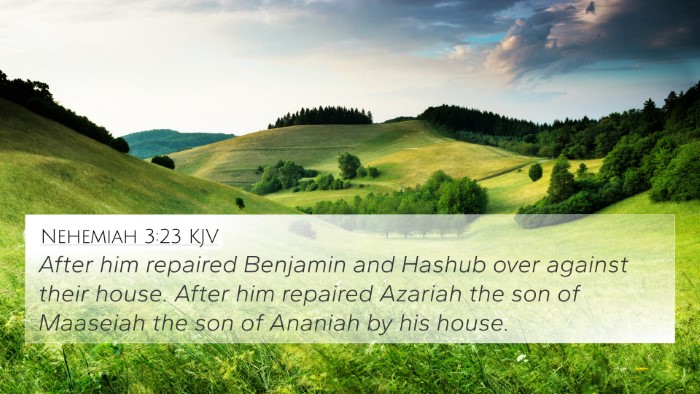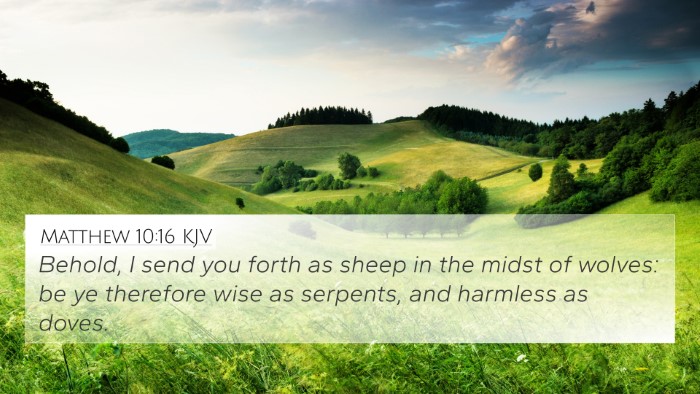Understanding Nehemiah 7:3
Nehemiah 7:3 states, "And I said unto them, Let not the gates of Jerusalem be opened until the sun be hot; and while they stand by, let them shut the doors, and bar them: and appoint watches of the inhabitants of Jerusalem, every one in his watch, and every one to be over against his house."
Summary of Nehemiah 7:3
This verse highlights Nehemiah's pragmatic leadership and his focus on security for Jerusalem. After the restoration of the walls, Nehemiah emphasizes the need to maintain vigilance to protect the city from potential threats. He instructs that the gates should not be opened until the heat of the day, indicating a time of safety, and he assigns guards to oversee different sections of the city. This demonstrates a balance between faith in God's protection and practical measures for security.
Insights from Commentaries
- Matthew Henry: Henry emphasizes the importance of diligence in safeguarding the city and the community. He notes that Nehemiah's instructions reflect not only a concern for immediate safety but also an understanding of the need for systematic security. The watchmen serve as a metaphor for spiritual vigilance in guarding against sin and danger.
- Albert Barnes: Barnes points out that Nehemiah's strategic approach shows exceptional wisdom in leadership. He reinforces the idea that preparation and caution are essential, especially in times of uncertainty. The mention of watches signifies an organized effort to ensure that every part of Jerusalem is protected.
- Adam Clarke: Clarke elaborates on the social implications of the gates being closed and the need for accountability among the inhabitants. He connects Nehemiah's leadership tactics with broader themes of communal responsibility in maintaining safety and order. His advice serves as a reminder of the necessity of cooperation for the welfare of the community.
Bible Verse Cross-References
- Proverbs 4:23: “Keep thy heart with all diligence; for out of it are the issues of life.” - This verse relates to spiritual vigilance and protecting one's moral and spiritual life.
- Nehemiah 4:9: “Nevertheless we made our prayer unto our God, and set a watch against them day and night, because of them.” - Highlights Nehemiah's emphasis on both prayer and vigilance.
- 1 Peter 5:8: “Be sober, be vigilant; because your adversary the devil, as a roaring lion, walketh about, seeking whom he may devour.” - This verse underscores the theme of alertness against danger.
- Isaiah 62:6: “I have set watchmen upon thy walls, O Jerusalem, which shall never hold their peace day nor night...” - A direct parallel in the need for watchfulness in the context of Jerusalem.
- Matthew 26:41: “Watch and pray, that ye enter not into temptation: the spirit indeed is willing, but the flesh is weak.” - Connects physical vigilance with spiritual alertness.
- Nehemiah 2:20: “Then answered I them, and said unto them, The God of heaven, he will prosper us; therefore we his servants will arise and build...” - Suggests coupling trust in God with diligent work.
- Exodus 14:14: “The Lord shall fight for you, and ye shall hold your peace.” - This highlights the belief in God’s sovereignty while also taking necessary actions for protection.
Connections Between Bible Verses
By examining Nehemiah 7:3, we can appreciate the intertwining themes of vigilance, security, and faith that resonate throughout Scripture. This verse serves as a profound reminder of the necessity of being watchful while relying on God's strength.
The cross-referencing of biblical texts such as Proverbs 4:23 and Matthew 26:41 enriches our understanding of spiritual and practical applications of vigilance. The thematic Bible verse connections emphasize that guarding oneself, whether spiritually or physically, is an integral part of a faithful life.
Tools for Bible Cross-Referencing
Engaging deeply with biblical scripture requires effective tools for cross-referencing. Utilizing a Bible concordance can aid in identifying related verses. A Bible cross-reference guide provides systematic ways to discover connections between Biblical texts, facilitating a more profound understanding of scriptural themes.
For those seeking comprehensive Bible cross-reference materials, methods like cross-referencing Bible study help in exploring the vast network of biblical dialogues, enhancing one’s study experience.
Conclusion
In conclusion, Nehemiah 7:3 serves as a powerful verse that encapsulates the dual aspects of vigilance and faith in God’s protection. The insights drawn from public domain commentaries give us a multifaceted perspective on the verse while the provided cross-references enhance our understanding of its broader biblical context. Exploring these connections allows for a richer interpretation and application of the Scriptures in daily life.
